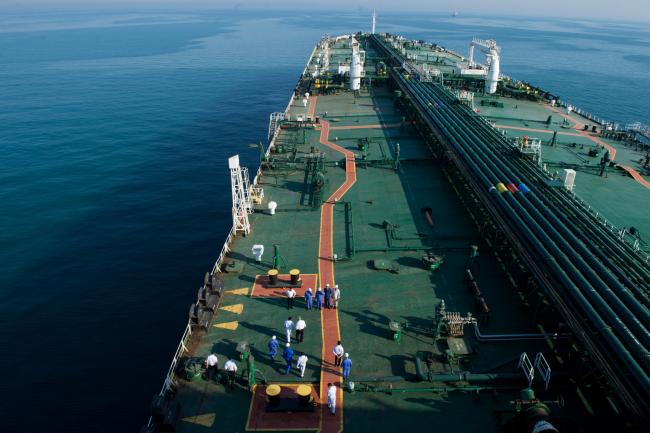(Bloomberg) -- Oil traded near $68 as investors weighed the impact of a potential U.S. pull-out from the Iran nuclear deal and the historic meeting between the leaders of North and South Korea.
Futures in New York slipped 0.4 percent, on course for a 0.7 percent drop this week. French President Emmanuel Macron earlier this week predicted President Donald Trump will exit the Iran agreement, while U.S. Defense Secretary Jim Mattis said Thursday a decision on a withdrawal hasn’t been made. North Korean leader Kim Jong Un and South Korean President Moon Jae-in agreed to finally end seven decades of hostile relations this year.
Oil this month touched the highest level in more than three years as speculation swirled over the potential breakup of the nuclear accord that Iran signed with world powers in 2015. The deal had lifted sanctions on the Islamic Republic, enabling it to boost oil production by about 1 million barrels a day. Investors are also watching global inventories amid signs that production cuts by the Organization of Petroleum Exporting Countries and its allies could continue to deepen while American output soars.
“The oil price should not fall in any significant way until the question of renewed Iran sanctions has been resolved,” said Carsten Fritsch, an analyst at Commerzbank AG (DE:CBKG) in Frankfurt.
West Texas Intermediate crude for June delivery traded at $67.91 on the New York Mercantile Exchange, down 28 cents, at 10:52 a.m. in London. Total volume traded was 6 percent below the 100-day average.
U.S.-Iran Situation
Brent crude for June delivery dropped 29 cents, or 0.4 percent, to $74.45 a barrel on the London-based ICE Futures Europe exchange. Prices are up 0.5 percent for the week. The global benchmark crude traded at a $6.55 premium to June WTI, near the widest premium this year.
Futures for September delivery rose 0.6 percent to 444.2 yuan per barrel on the Shanghai International Energy Exchange in afternoon trading on Friday. The contract is on course for a 1.7 percent gain this week.
There’s been no decision made on “any withdrawal” from the Iranian nuclear deal and discussions are still ongoing among U.S. government officials, Mattis said during a testimony on Capitol Hill on Thursday. That comes after French President Macron said in Washington that he believes the U.S. President will get rid of the deal on his own for “domestic reasons.”
The nervousness around a potential breakdown in the deal is also spilling over into the physical oil market. Traders are unwilling to sign contracts for Iranian crude and refined products that would be valid after May 12, the deadline for Trump to decide whether to reimpose sanctions, according to recent interviews with six companies that buy and sell cargoes in the Middle East.
Also in focus is the first summit between the leaders of the two Koreas in 11 years. The North Korean leader made history by walking across the border and called for more talks with his counterpart from the South. Investors are trying to determine whether the symbolism-laden meeting can eventually lead to a deal with the U.S., finally resolving the escalating nuclear tension on the peninsula.
Other oil-market news:
- While plunging output in Venezuela captures the oil world’s attention, problems are quietly festering in another OPEC nation. Angola, once Africa’s biggest crude producer, is suffering sharp declines at under-invested offshore fields.
- China Petroleum & Chemical Corp. is a step closer to turning the page on oil’s crash as its exploration and production business staged the best performance in more than three years after a recovery in global prices.
- Iraq awarded contracts for just over half of the energy deposits offered in an auction that failed to attract bids from most of the big oil companies that initially expressed interest.
- As gasoline pump prices near an average of $3 a gallon across the U.S., Americans have shown little restraint in their fuel purchases. But demand destruction could emerge if oil hits $80 a barrel, Valero Energy Corp (NYSE:VLO). said Thursday on its first-quarter earnings call.
- Around 20,000 people were evacuated from their homes in Superior, Wisconsin, as firefighters extinguished a second blaze at Husky Energy Inc.’s 38,000-barrel-a-day refinery.
